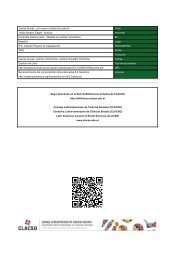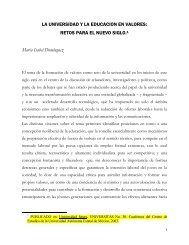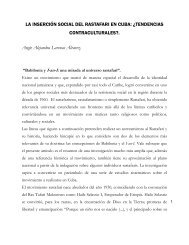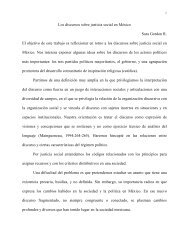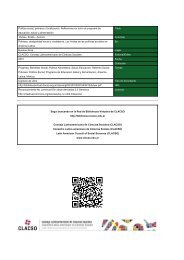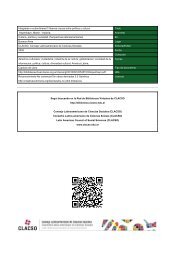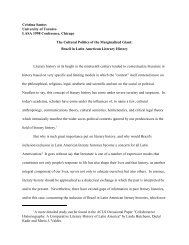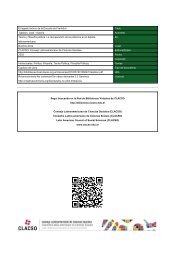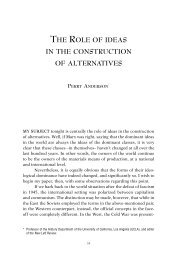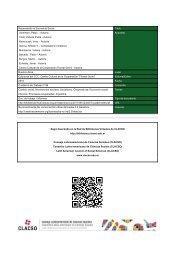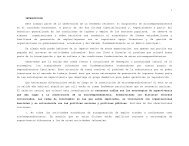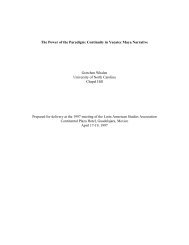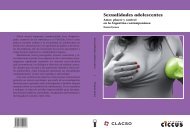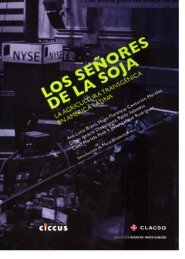hegemony and imperialism in the international system - Clacso
hegemony and imperialism in the international system - Clacso
hegemony and imperialism in the international system - Clacso
You also want an ePaper? Increase the reach of your titles
YUMPU automatically turns print PDFs into web optimized ePapers that Google loves.
NEW WORLDWIDE HEGEMONY. ALTERNATIVES FOR CHANGE AND SOCIAL MOVEMENTS<br />
Iraq, for example– but <strong>the</strong> rout<strong>in</strong>e of imperialist oppression can do<br />
without <strong>the</strong>m on a day-by-day basis. Docile governments, media controlled<br />
by <strong>the</strong> monopolies <strong>and</strong> converted <strong>in</strong>to mere propag<strong>and</strong>a factories,<br />
demobilized <strong>and</strong> demoralized civil societies, <strong>and</strong> corrupt politicians<br />
are much more useful than Mar<strong>in</strong>e platoons or Apache helicopters.<br />
If, <strong>in</strong> <strong>the</strong> past, coups d’etat <strong>and</strong> military dictatorships were<br />
required to impose imperialist policies, <strong>in</strong> today’s Lat<strong>in</strong> America this<br />
job is performed by “democratic” governments aris<strong>in</strong>g from <strong>the</strong> popular<br />
vote <strong>and</strong> that have made a cult of betrayal <strong>and</strong> mendacity. Lastly,<br />
except for very specific situations like Iraq <strong>and</strong> Afghanistan, territorial<br />
occupation has become redundant s<strong>in</strong>ce, by means of trade open<strong>in</strong>g,<br />
privatizations <strong>and</strong> deregulation, <strong>the</strong> economies subjected to <strong>imperialism</strong><br />
are today more dependent than ever without <strong>the</strong> need to fire a<br />
s<strong>in</strong>gle shot or deploy a s<strong>in</strong>gle soldier.<br />
That is why we said that <strong>imperialism</strong> has changed, <strong>and</strong> <strong>in</strong> some<br />
aspects <strong>the</strong> change has been very significant. But it can never be overstressed<br />
that, despite everyth<strong>in</strong>g, it has not been transformed <strong>in</strong>to its<br />
opposite, as is suggested to us by neoliberal mystification, turn<strong>in</strong>g <strong>in</strong>to<br />
a “global” economy <strong>in</strong> which all nations are “<strong>in</strong>terdependent.” It cont<strong>in</strong>ues<br />
to exist <strong>and</strong> to oppress peoples <strong>and</strong> nations, <strong>and</strong> to sow pa<strong>in</strong>,<br />
destruction <strong>and</strong> death <strong>in</strong> its wake. Despite <strong>the</strong> changes it preserves its<br />
identity <strong>and</strong> structure, <strong>and</strong> cont<strong>in</strong>ues to perform its historical role <strong>in</strong><br />
<strong>the</strong> logic of <strong>the</strong> global accumulation of capital. Its mutations, its<br />
volatile <strong>and</strong> dangerous mixture of persistence <strong>and</strong> <strong>in</strong>novation, require<br />
<strong>the</strong> construction of a new approach that will allow us to grasp its current<br />
nature. This isn’t <strong>the</strong> place to proceed to an exam<strong>in</strong>ation of <strong>the</strong><br />
diverse <strong>the</strong>ories on <strong>imperialism</strong>. Let us say, by way of summary, that<br />
beyond <strong>the</strong> transformations <strong>in</strong>dicated above, its fundamental attributes<br />
po<strong>in</strong>ted out by <strong>the</strong> classical authors at <strong>the</strong> time of <strong>the</strong> First World<br />
War cont<strong>in</strong>ue to be current by virtue of <strong>the</strong> fact that <strong>imperialism</strong> is not<br />
an accessory feature or a policy pursued by some states but a new<br />
stage <strong>in</strong> <strong>the</strong> development of capitalism. This stage is marked, today<br />
with greater forcefulness than <strong>in</strong> <strong>the</strong> past, by <strong>the</strong> concentration of capital,<br />
<strong>the</strong> overwhelm<strong>in</strong>g predom<strong>in</strong>ance of <strong>the</strong> monopolies, <strong>the</strong> heightened<br />
role of f<strong>in</strong>ancial capital, <strong>the</strong> export of capital <strong>and</strong> <strong>the</strong> carv<strong>in</strong>g up<br />
of <strong>the</strong> world <strong>in</strong>to different “spheres of <strong>in</strong>fluence.” The acceleration of<br />
<strong>the</strong> process of mondialization that took place <strong>in</strong> <strong>the</strong> last quarter of a<br />
century, far from mitigat<strong>in</strong>g or dissolv<strong>in</strong>g <strong>the</strong> imperialist structures of<br />
<strong>the</strong> world economy, did noth<strong>in</strong>g but extraord<strong>in</strong>arily streng<strong>the</strong>n <strong>the</strong><br />
structural asymmetries that def<strong>in</strong>e <strong>the</strong> <strong>in</strong>sertion of different countries<br />
140



